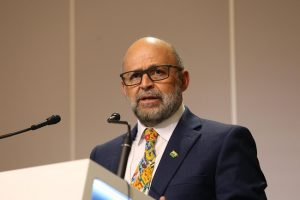The Global Environment Facility’s governing board will start 2024 with decisions on more than $1 billion in funding for climate change adaptation, biodiversity, ocean health, pollution control, and more, as the GEF family of funds continues to expand the support it provides across multiple international environmental conventions.

The GEF Council will consider a $916 million work programme – the second largest in the multilateral trust fund’s history – during its February 5 to 9, 2024, gathering.
The representatives of the GEF’s 186 member countries will also consider $203 million in adaptation financing from the Least Developed Countries Fund (LDCF) and Special Climate Change Fund (SCCF), and will constitute the very first board meeting of the new Global Biodiversity Framework Fund (GBFF).
Each of these GEF-managed funds are gearing up for a high-stakes year where countries reeling from record heat and disasters will meet for Conferences of the Parties on biodiversity, climate change, and desertification, and advance collaboration on chemicals, plastics, the ocean, and wildlife.
“If there is one lesson from 2023, it is that we have no time to lose. The GEF is working to quickly and efficiently deploy all resources that donors have entrusted to us for the 2022-2026 period so that we can generate maximum benefits for our recipient countries and for the planet,” said Carlos Manuel Rodríguez, GEF CEO and Chairperson.
“We look forward to gathering with our Council members to review our progress as a GEF partnership and keep fuelling positive momentum in environmental cooperation through fast, effective support for impactful and inclusive initiatives that can build a better future.”
Each dollar in the proposed GEF work programme spanning 77 countries is expected to mobilise another $8.90 in co-financing from other sources.
The package of proposed grants will support projects related to biodiversity, climate change, food systems, forest management, land degradation, river and ocean health, chemicals and waste, and wildlife. It also includes $570 million for Integrated Programmes that address the drivers of environmental degradation through a cross-cutting approach.
Four additional projects are recommended for support from the GEF Trust Fund as well as the two climate adaptation funds managed by the Global Environment Facility – the LDCF and SCCF.
Adding to the GEF work programme financing, Council members will consider another $203 million for LDCF and SCCF for climate adaptation projects in Least Developed Countries, Small Island Developing States, and other developing nations. The LDCF/SCCF work programme is one of the largest in the adaptation funds’ history and reflects growing demands on these unique vehicles to help countries increase their resilience in fast-changing conditions.
Council members will also review initial guidelines for the enabling activities and ratification support projects that the GEF can provide for the new UN Convention on the Law of the Sea on the conservation and sustainable use of marine biological diversity of areas beyond national jurisdiction, known by the acronym BBNJ.
Adopted in 2023, this agreement identifies the GEF Trust Fund as part of its financial mechanism, which is a widening of the GEF’s scope of support beyond international conventions on biodiversity, climate change, desertification, mercury use, and toxic chemicals. Such activities will be instrumental in promoting rapid entry into force and swift implementation of the treaty.
Finally, country representatives will meet for the first time as Council of the new GBF Fund, which parties to the Convention on Biological Diversity requested the GEF to host just over a year ago when they agreed in December 2022 on new goals that developing countries will need financial support to meet. Since then, the GEF has officially established the fund, enabled its ratification, prepared a programming framework, and guided its initial capitalisation, in preparation for the fund’s first Council meeting.
The GBFF Council will consider a proposed set of policies determining how donor resources will be allocated, and how projects supported by the fund will be reviewed and approved. It will also review proposed budgets for the fiscal years 2024 and 2025 and discuss plans for advisory groups that will support for the governance of the new fund. Reaching this stage has been the result of extensive and dedicated consultations with key stakeholders across the GEF partnership and beyond.
The GBFF’s first work programme is expected later this year, with financing by the end of 2024.
GEF Director, Claude Gascon, said the efficient establishment of the GBFF as well as the large work programs to be considered by the GEF Council as 2024 gets underway were reflective of the Global Environment Facility’s agility, and ability to quickly deploy resources where they are most needed.
“We are well ahead of schedule in programming and deploying the record resources that donors have entrusted us with, putting us on track for major headway toward international environmental goals,” Gascon said. “The GEF is committed to continuing to increase our effectiveness throughout this funding cycle and into GEF-9 with a focus on integration, inclusion, and impact.”
